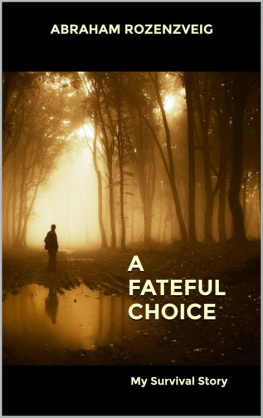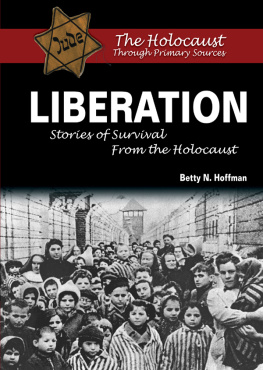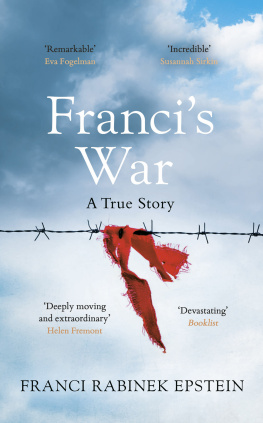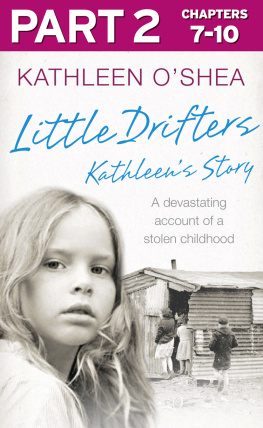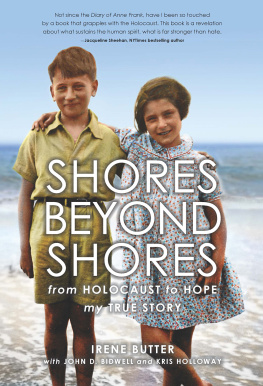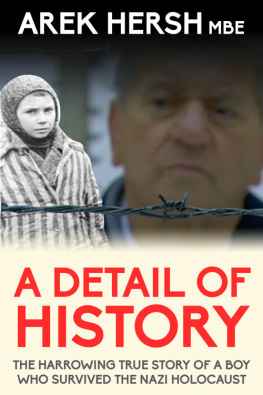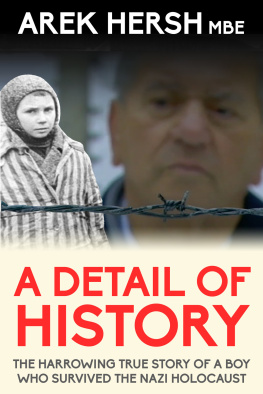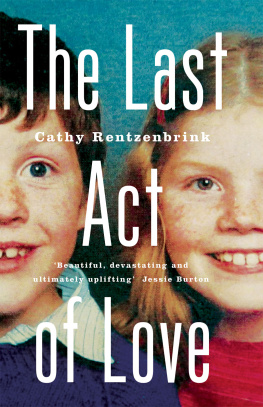Editing and translating our fathersbook to English was an emotional journey and a labor of love, as was ourin-depth involvement in the writing process of the original book in Hebrew. We are grateful to be able to share our fathers profound story andleave this incredible legacy for our children and for generations to come.
We would like to dedicate this book to ourgrandparents, Gedalia and Sara Rozenzveig, whom weve never met, yet towhom we feel so close and who live inside of us always, thanks to the manystories and memories our father related to us over the years.
A very special thanks to Orit Krikov, whosewarmth, intelligence and patience enabled our father and her to write thismoving account so eloquently.
We want to express our gratitude to ourparents Zipora and Abraham Rozenzveig, for their boundless love and devotion tous and each other, and for setting such a splendid example for us and ourchildren in so many ways.
A FORGOTTEN PASTORAL WORLD
The Years Just Before WWII, 1934 - 1939
By the age of seven I was no longer a child. I wasstill seven years old, but no longer a child. The nearly sole responsibilityfor my life was transferred to my own two hands, the not so very large hands ofa small boy. Yes, fortunately for me there was a family who looked after me,but I knew that if I wanted to stay alive, I must be as inconspicuous aspossible. I mustnt be a burden to others. Death was all around me, andmy mission was to stay alive.
In order to understand my world before I turnedseven, I will start at the beginning. I was born in Baranovich, then in Poland,a city surrounded by forests and swamps, where my parents moved to from a smallvillage. I dont know the date of my birth. I have no birth certificate.My uncle, Chaim Tennenbaum (my mothers brother), my only close familymember who survived, recalled vaguely that I was born either in 1933 or 1934,during Chanukah. I have no records from before the war, and no photos. The onlyphoto of my parents that I possess was given to me many years later by a cousinwho made Aliyah before the war.

Engagement of my parents Gedalia Rozenzveig andSara Tennenbaum, Oct. 1929
Today, the city of Baranovich is part of Belarus. Atthe end of the 18th century, Baranovich became part of the Russian empire aspart of the partition of Poland, although during World War II, it was in Polishterritory. On the eve of World War II, its population consisted of 12,000 Jews,making up more than half of the city population. The rest was comprised ofPoles and Belarusians.
As previously mentioned, my parents arrived inBaranovich from another town. My father, Gedalia Rozenzveig, and my mother, Saranee Tennenbaum, were both born in Piszczac, a small village southwest ofBaranovich. Earning a livelihood in the village was extremely difficult withvery few job possibilities. That is why my parents, along with much of theextended family, decided to move to Baranovich, a more developed town thatserved as a major railway junction at the time. My grandparents remained inPiszczac.
Piszczac was a small village in eastern Poland, closeto the border of present-day Belarus. The population never exceeded 1,200inhabitants. The first record of the arrival of Jewish settlers was from thesecond half of the 18th century. The non-Jewish residents were mostly peasantfarmers while the Jews dealt mainly in petty trade.
I dont remember much about my grandparents. Myfathers parents, Moshe Ber and Ruchale Rozenzveig, stayed in Piszczac. Irecall meeting my grandfather only once. It was during one of my fatherstrips to Warsaw that he took me with him. He intended to drop me off at hisparents house on the way to Warsaw, since the train stopped nearby, andto pick me up on the way back. The train halted and we got off. I was aboutfive or six years old and held my fathers hand. The village looked likea set from "Fiddler on the Roof", a Jewish shtetl with a few woodenhouses surrounding the market square. We went into a house, and there stood mygrandfather, the melamed, a man with a white beard. He faced twosmall, crying boys near a prayer table. I saw that my grandfather held in hishand a kanchik - a leather strap used to punish students.Frightened, I held on to my father.
Father said to me : "Avramele, this isyour grandfather. Youll stay here until I return."
I was a quiet boy who never spoke back to myparents. But I looked again at the man my father claimed was my grandfather, atthe crying boys, and held my fathers hand as tightly as a five year oldchild could, and cried: "No!"
Father: "Hes your grandfather.Its OK. I will come back soon."
Me: "I am not staying here" andadded, "Dont leave me here. If you take me with you, I promise Iwont be a bother."
His pleas were of no avail, I refused to staybehind, not even for a minute. My father had to forgo his planned trip toWarsaw and took me back home. This is my only memory of my grandfather.
My maternal grandparents, Joseph and ShevaTennenbaum, had also moved to Baranovich and lived in my Uncle Chaimshome. I recall the following story about them: When he was 34 years old, mygrandfather, like many other Jews and non-Jews, decided to try his luck inAmerica. He left behind his wife and young children, planning to bring themlater. In 1904, he left Piszczac for the long, long road through Europe, untilhe boarded a passenger ship from the port of Rotterdam, Holland. After nearlytwo weeks crossing the Atlantic Ocean, he disembarked on Ellis Island near theStatue of Liberty, the symbol of hope for so many new immigrants. He made hisway to his brother Abraham, who was living on Orchard Street in New York City.Despite the temptation to stay in the Promised Land of financialopportunities, my grandfather returned to Piszczac. My grandmother Sheva hadnot wanted to leave her familiar surroundings, her shtetl, and refused to takethe long and arduous journey into the unknown. And this is the reason I was notborn in America
Life in Baranovich was everything a child could askfor. I was surrounded by my close family: father, mother and two brothers, andby a large, extended family, and all this in a supportive and cohesive Jewishcommunity. Or so it seemed to me as a child. I do not remember much contactwith non-Jews, Gentiles, even though my parents, especially my father, knewmany. My father conducted business with non-Jews and had friendly relationswith some.

